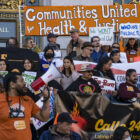California
Plan for 82,000 Homes in San Francisco Moves Forward, Under Pressure From State
The Board of Supervisors passed a plan to build 82,000 housing units over the next eight years, maintaining city control over the permitting and building processes. Some critics said the plan does not do enough to prevent low-income residents from displacement as more market-rate apartments are built.












